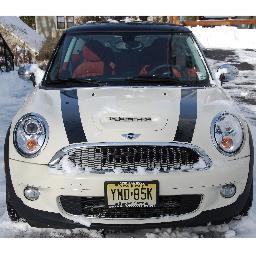
The Numbers
@WSJnumbers
The Wall Street Journal examines the way numbers are used, and abused.
You might like
Jo Craven McGinty shares her thoughts on numbers and numeracy (and a quiz!) as she says goodbye to the Numbers column wsj.com/articles/the-f… via @WSJ
LED light bulbs promise greater longevity than their incandescent counterparts. Here’s why that claim might not always hold up. wsj.com/articles/why-l… via @WSJ
The net undercount of young children in the 2010 census was 4.6%, demographers estimate. They say it might be larger for the 2020 census. wsj.com/articles/count… via @WSJ
Thirty people volunteered to get Covid-19 for the sake of science. wsj.com/articles/unlik… via @WSJ
The main index used to measure obesity—called BMI—is flawed: It doesn’t distinguish fat from muscle or other tissue. Here’s why doctors continue to use it. wsj.com/articles/youre… via @WSJ
Hurricane names are reused until a storm causes too much damage. Ten were named "Florence" before that name was retired, and dozens more have also been removed from the list of approved names. #WSJNumbers wsj.com/articles/hurri… via @WSJ
Deaths and serious injuries related to fireworks rose sharply last year—and surged around July 4—as revenue from sales of pyrotechnics grew to a record $1.9 billion wsj.com/articles/firew… via @WSJ
Dietary supplements are more popular than ever, but what's on the label isn't necessarily what's in the bottle wsj.com/articles/the-f…
People are generally bad at assessing probabilities--and one famous example demonstrated that even experts can get tripped up. wsj.com/articles/what-…
To the irritation of the scientific community, the word "supermoon" was coined by an astrologer and describes a phenomenon scientists contend the human eye can’t detect. Pizzas help visualize the difference. #WSJNumbers wsj.com/articles/the-m… via @WSJ
Not all plastics stamped with a recycling code will be recycled--even if they make it into a recycling bin. Here's why 90% of plastics end up in a landfill or incinerator. wsj.com/articles/recyc… via @WSJ #WSJNumbers
A lot about how Rawlings makes MLB’s official ball is kept secret. Here’s what we do know ahead of the 2021 season’s Opening Day wsj.com/articles/as-ml… via @WSJ
Guess how many NCAA Division I athletic departments generate enough revenue to cover their own expenses? #WSJNumbers wsj.com/articles/march… via @WSJ
How many Americans plan to get a Covid-19 vaccine? The answer might depend on how you ask the question. wsj.com/articles/in-co… via @WSJ
In four hours, 65 commercials costing an average $5.6 million per 30-second spot aired before 91.5 million Super Bowl LV viewers. Was it worth it? wsj.com/articles/the-r… via @WSJ
“Chicks don’t want a guy with a cat.” When it comes to online dating, the pet in your profile matters. wsj.com/articles/for-b… via @WSJ
Why is the world’s tallest geyser so tall? And why did it reactivate after 3.5 dormant years? #WSJNumbers wsj.com/articles/the-w… via @WSJ
What animal has a lifespan of up to 512 years? What is the average normal human-body temperature? Which month sees the most drug approvals? Here’s a quiz to test recollections of our The Numbers column on.wsj.com/3p4K3bL
Did Benford’s Law, an accounting tool used to detect fraud, really uncover cheating in the presidential election? wsj.com/articles/can-a… via @WSJ
Pop culture suggests humans use only 10% of their brains. Science says that's not true. But where did the idea come from to begin with? #WSJNumbers wsj.com/articles/is-yo… via @WSJ
United States Trends
- 1. #GRAMMYs 106K posts
- 2. #FanCashDropPromotion 2,645 posts
- 3. ADDISON RAE 8,161 posts
- 4. olivia dean 4,426 posts
- 5. Dizzy 7,463 posts
- 6. Clipse 4,204 posts
- 7. #FridayVibes 5,638 posts
- 8. gaga 53.4K posts
- 9. Good Friday 63.7K posts
- 10. Katseye 59.2K posts
- 11. Leon Thomas 5,045 posts
- 12. chappell 6,702 posts
- 13. Album of the Year 28.3K posts
- 14. #FursuitFriday 10.1K posts
- 15. Munetaka Murakami 2,389 posts
- 16. Kehlani 22.6K posts
- 17. #FridayFeeling 3,434 posts
- 18. Happy Friyay 1,680 posts
- 19. Best New Artist 8,342 posts
- 20. Record of the Year 18.4K posts
You might like
-
 Bloomberg
Bloomberg
@Bloomberg -
 WSJ Tech
WSJ Tech
@WSJTech -
 BBC Radio 5 Live
BBC Radio 5 Live
@bbc5live -
 Heard on the Street
Heard on the Street
@WSJheard -
 TreasuryDirect
TreasuryDirect
@TreasuryDirect -
 WSJ Banking
WSJ Banking
@WSJBanking -
 WSJ Politics
WSJ Politics
@WSJPolitics -
 Andrew Pollack
Andrew Pollack
@AndrewPollackFL -
 WSJ Life & Arts
WSJ Life & Arts
@WSJLife -
 Jonathan Weil
Jonathan Weil
@JonathanWeil -
 WSJ Health
WSJ Health
@WSJhealth -
 This Morning
This Morning
@ThisMorningShow -
 Hedge Fund Focus
Hedge Fund Focus
@hedgefundfocus -
 WSJ Podcasts
WSJ Podcasts
@WSJPodcasts -
 David Wessel
David Wessel
@davidmwessel
Something went wrong.
Something went wrong.























































































































